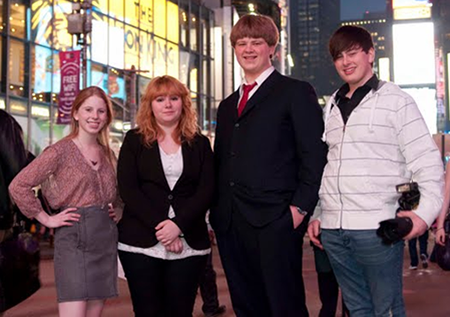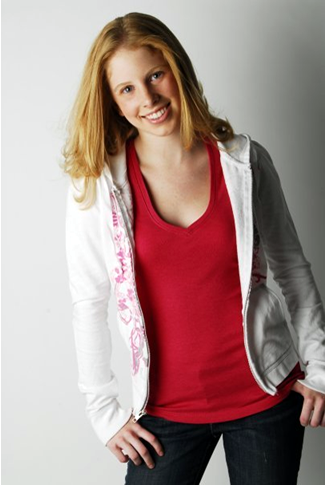
What is the Model United Nations?
A Report from the 37th Annual IMUN Conference
by Carolyn Willander
"A good diplomat can tell you to go to hell in such a way that you will look forward to the trip."
With these words, U.S. Ambassador Joseph Melrose addressed the high school delegates gathered in New York City for the opening ceremony of the 37th annual National High School Model United Nations (MUN) conference.
Nearly 3,000 delegates from approximately 20 countries and 150 schools participate in the 4-day MUN conference each March. Students from Sturgis Charter Public School participated this past spring, under the guidance of History teacher Matthew Fetzer.
The focus of this year's conference was on global economics issues and their effect on policy decisions. Students were assigned to represent nearly 200 countries in over 20 committees addressing related topics.
The first committee sessions followed the opening ceremonies. Students who were tired from a long trip would have to wait until midnight to get to bed. The first order of business was to choose between the two proposed topics for debate. This decision was made using a moderated caucus, in which students spoke for 30 seconds in support of a topic.
By the end of the night, nearly every committee had made its decision. Charlotte Olsen, a Sturgis senior, noted, "During the first session we were really productive and I was really proud."
At the end of the first full day, huge progress had been made overall, and working papers were completed and distributed for review the next day. In some committees, however, order could not be maintained despite the moderator's best efforts.
For students in these committees, like Sturgis Senior Liz Laprade, "It ended up being really frustrating dealing with kids who didn't care about the foreign policy of the countries they represented."

The second committee session began at 9 a.m. Thursday morning. There was a lot on the agenda as committees moved past procedure and into actual issues. This session was devoted to voicing your "country's" opinion and forming alliances through moderated and unmoderated caucuses.
Students freely made motions to speak, some more eager than others. Meanwhile, they passed official notes to countries with whom they agreed. Decorum became an issue from both devoted and distracted students; some were unhappy with the results of the debates, while others spent time socializing.
Larger countries often took the lead in discussions, while smaller countries struggled to find their place. Sturgis Senior Andrew Fribush, who represented Syria, said, "It's very hard to move into the diplomatic circle."
Darius Hickey, also a Sturgis Senior and who represented Macedonia, said his country's position was very limited. "I was forced to remain neutral on certain key points that I personally felt strongly either for or against." This is a great example of the difficulties of being a small country in the international arena, or one that perhaps didn't have a strong opinion on a particular topic.
The fourth and fifth sessions on Friday could be considered the most or the least productive. Amendments to the various working papers poured out and were voted on. Some students became restless and disruptive after hours in committee. "A lot times it breaks down because we've already done a lot, so we feel accomplished, and also it's late and we get fussy," said Charlotte Olsen.
IMUN Executive Director Jerry Guo led the closing ceremonies, explaining the importance of the annual event to the exhausted but proud delegates. He said, "By coming up with solutions to problems this early, it is very likely you will solve them in the future." By doing so, students were taking the first real steps towards progress, not just simulating it.
 |
What is MUN?
For those who aren't sure, MUN is a simulation of the actual United Nations. Since the League of Nations was established in the 1920s, students have been participating in some form of MUN.
MUN may take the form of a club or class at the high school or collegiate level, and teaches skills such as communication, ethics, and public speaking. Students don the role of a diplomat representing an assigned country, and defend their positions in a committee.
MUN gives students a unique opportunity, exposing them to a wide range of people and opinions. It teaches valuable, real world skills that can be used not just in the realm of international relations, but in school, work, and social situations.
The knowledge of current events and diplomacy provides students with a broader understanding of the world, making them critical and objective thinkers.
Participation in MUN requires commitment, research, and preparation. Students are assigned a country, and must become thoroughly aware of its political history, affiliations, and conditions.
They are then assigned to a committee where they represent their country; these committees are the same as those in the actual UN, and address topics such as economics, law, and humanitarianism. Students write position papers detailing their country's standing on a particular topic to be debated in the committee sessions.
In committee sessions, moderators control the debates and discussions until the delegates are able to decide on resolutions. This requires hours of deliberation and consultation. Solutions are presented, voted on, and hopefully passed in a plenary session. In this manner, students develop solutions to real world problems, in a manner very similar to that of the actual UN.
While a delegate must be willing to put in the time and effort in and out of committee, MUN is not "all work and no play." By the second committee, you can be sure that you will have made a new friend, and events like delegate dances promote socializing and provide entertainment.
In the case of the Sturgis MUN, students also had the chance to experience life in the city. Said Sturgis Senior Chandler Mitchell, "The experience is worthwhile."

Carolyn Willander is a Senior at Sturgis Charter Public School. She is a full International Baccalaureate (I.B.) diploma candidate.
Carolyn has joined the CapeWomenOnline team as a regular contributing writer.
Her work with this magazine will earn Carolyn credit toward her C.A.S. (Creativity, Action and Service) requirements, which is a fundamental aspect of the full I.B. Degree.